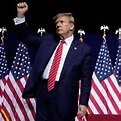In a surprising disclosure, ex-advisers of Donald Trump have expressed apprehensions regarding the former president’s inclination to commend despotic rulers, both in private conversations and during his election campaigns. The revelations shed light on Trump’s approach to foreign policy and his willingness to cozy up to authoritarian regimes, raising questions about the implications for global diplomacy and human rights.
According to accounts from former aides, Trump’s admiration for despots was not limited to private conversations but was also evident in his public statements during his tenure as president and on the campaign trail. From praising the likes of Vladimir Putin of Russia to Kim Jong Un of North Korea, Trump’s affinity for strongman leaders drew criticism and condemnation from across the political spectrum.
The concerns raised by former advisers highlight the potential risks associated with Trump’s approach to foreign relations. By aligning himself with authoritarian leaders known for their human rights abuses and suppression of dissent, Trump’s actions undermined America’s credibility as a champion of democracy and freedom on the global stage.
Moreover, Trump’s praise for despots sent mixed signals to US allies and adversaries alike, complicating diplomatic efforts and eroding trust in America’s leadership. While some viewed Trump’s willingness to engage with autocratic regimes as a pragmatic approach to advancing US interests, others saw it as a betrayal of core democratic values and principles.
The revelations about Trump’s admiration for despots also raise questions about his motivations and mindset. Some analysts speculate that Trump’s admiration for strongman leaders stemmed from a desire for personal validation and a belief in the effectiveness of authoritarian governance. Others suggest that Trump’s admiration for despots was driven by strategic considerations and a transactional approach to foreign policy.
Regardless of the underlying reasons, Trump’s praise for despots has far-reaching implications for US foreign policy and its standing in the world. By cozying up to authoritarian leaders, Trump undermined America’s moral authority and weakened its ability to promote democracy and human rights globally.
The concerns raised by former advisers underscore the need for a recalibration of US foreign policy in the post-Trump era. As the Biden administration seeks to restore America’s leadership role on the world stage, it must prioritize principles of democracy, human rights, and the rule of law in its dealings with other nations.
Moreover, the revelations about Trump’s admiration for despots serve as a cautionary tale about the dangers of leaders who prioritize personal interests over the common good. In a world where authoritarianism is on the rise and democratic values are under threat, leaders need to uphold the principles of freedom, equality, and justice.
The disclosures regarding Donald Trump’s admiration for despots, as revealed by former advisers, underscore the intricacies and obstacles inherent in US foreign policy. By cozying up to authoritarian leaders, Trump undermined America’s credibility and moral authority on the global stage, raising concerns about the implications for democracy and human rights worldwide. As the United States seeks to regain its leadership role in the world, it must prioritize principles of democracy, human rights, and the rule of law in its interactions with other nations.




